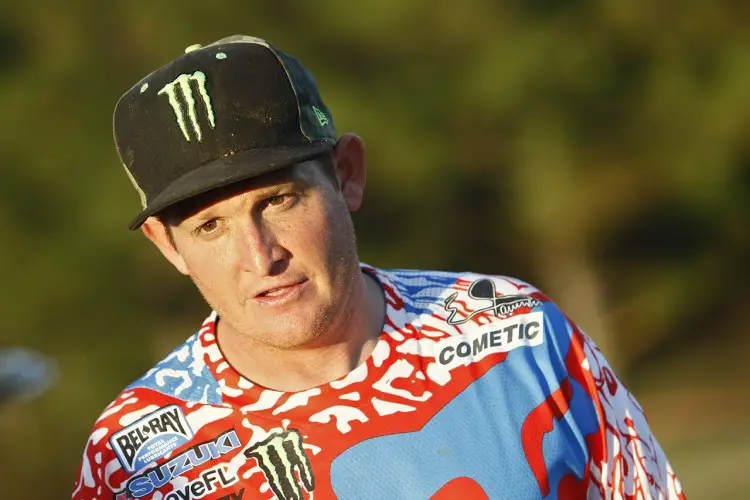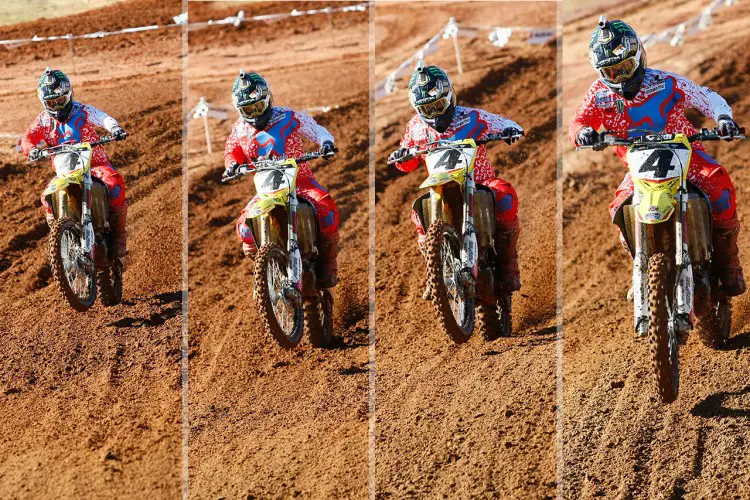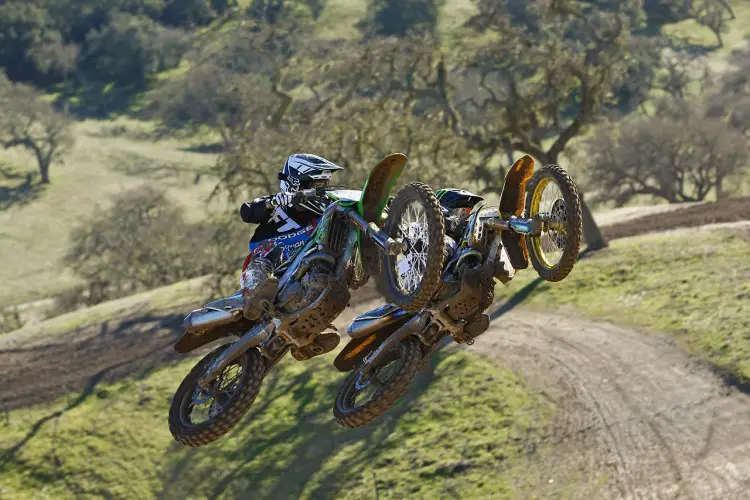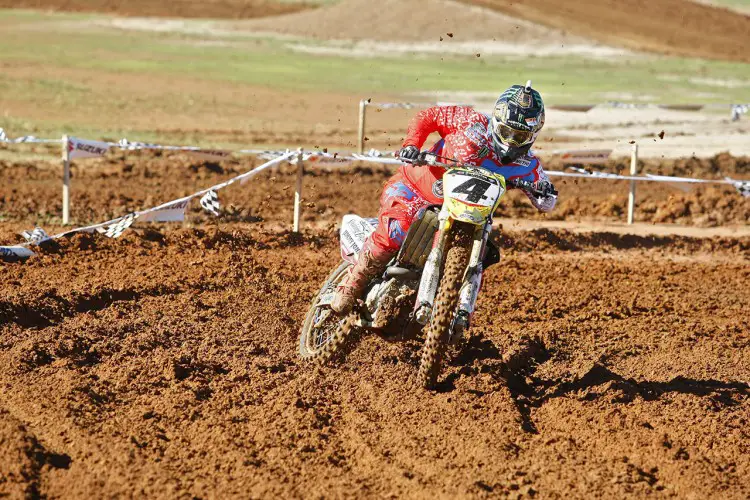INTERVIEW OF THE WEEK: RICKY CARMICHAEL
 Ricky Carmichael isn’t in the public spotlight as much as he was while racking up race wins, but the 15-time champion is incredibly busy.
Ricky Carmichael isn’t in the public spotlight as much as he was while racking up race wins, but the 15-time champion is incredibly busy.
By John Basher
A 15-time champion, one of the most celebrated racers in the history of the sport, and with 150 career wins to his name, Ricky Carmichael earned the distinction of being the Greatest Of All Time. It’s hard to believe that RC called it quits eight years ago. So much has happened since then. However, Carmichael hasn’t seemed to change much in the time since hanging up his boots. Sharp and witty as ever–not to mention still blazing fast on a bike–Ricky remains actively involved in the sport. Aside from his duties as an ambassador for Suzuki and holding riding clinics (Carmichael is currently in Australia holding a Ricky Carmichael University), RC part owner of the RCH Suzuki team.
Hear what Ricky has to say about Camp Carmichael (a three-day event for the top 24-earning amateur Suzuki contingency racers), working with Suzuki, the break-up between Ken Roczen and Aldon Baker, and much more.
 Ricky, where did the Camp Carmichael idea come from? With me being an ambassador for Suzuki and my history with Suzuki, we came up with a concept four years ago to benefit the amateurs who race Suzuki’s. The top-earning contingency riders were given the chance to come to my farm for a fantasy camp. We named it Suzuki Camp Carmichael. The riders come to my place for a few days. Our program is set up so that one day is devoted to the mini bike riders, another day is strictly for big bikes, and the final day is an open riding session. During the first two days we go through full, in-depth training. We go through drills that I used to do when I was racing professionally. We focus on corners, jumps, starts, and various race situations. That way the riders can take what they learn, go home, and practice those things throughout the year. It has been really good. The audience has been very receptive to it.
Ricky, where did the Camp Carmichael idea come from? With me being an ambassador for Suzuki and my history with Suzuki, we came up with a concept four years ago to benefit the amateurs who race Suzuki’s. The top-earning contingency riders were given the chance to come to my farm for a fantasy camp. We named it Suzuki Camp Carmichael. The riders come to my place for a few days. Our program is set up so that one day is devoted to the mini bike riders, another day is strictly for big bikes, and the final day is an open riding session. During the first two days we go through full, in-depth training. We go through drills that I used to do when I was racing professionally. We focus on corners, jumps, starts, and various race situations. That way the riders can take what they learn, go home, and practice those things throughout the year. It has been really good. The audience has been very receptive to it.
From what I understand there are several return amateur riders at Camp Carmichael for this year. Yes, and that’s a good thing. Some of these guys have been riding a Suzuki for a long time. Take a look at Barry Carsten. He’s been riding a Suzuki for as long as I’ve known him. When you see these guys that are returning, they know the coaching and understand the process. When I go to amateur races and watch them, I see they’re doing the things that we worked on here at the camp. We also get some newcomers. It’s a nice incentive for people who race Suzuki. As an ambassador, I really enjoy holding the camp and meeting a lot of great people.
“AMATEUR RACING IS THE GRASSROOTS OF THE SPORT, AND IT’S IMPORTANT TO GET RIDERS ON THE PRODUCT. WE WANT TO SEE KIDS SPEND THEIR AMATEUR CAREERS ON SUZUKI, AND THEN ROLL INTO THE PROFESSIONAL RANKS WITH SUZUKI SUPPORT. WE’RE PUSHING HARD, AND I’M GLAD TO SEE THAT SUZUKI IS STEPPING UP. THE AMATEUR SCENE IS INCREDIBLY IMPORTANT FOR THE HEALTH OF OUR SPORT.”
What do you think about the camp itself, and Suzuki’s return to the amateur ranks? I like to think that doing things like Camp Carmichael helps Suzuki get back into the amateur scene. I wanted to help the movement in getting Suzuki into amateur racing again. It was time for them to do this. Amateur racing is the grassroots of the sport, and it’s important to get riders on the product. We want to see kids spend their amateur careers on Suzuki, and then roll into the professional ranks with Suzuki support. We’re pushing hard, and I’m glad to see that Suzuki is stepping up. The amateur scene is incredibly important for the health of our sport.
You raced for factory Kawasaki, Honda and Suzuki during your racing career. Why did you decide to continue your relationship with Suzuki following your retirement and not one of the other colors? Fortunately, I still have great relationships with the other brands I rode for, but Suzuki has always shown the most interest. They come to me with open arms, and they are very open to having me help them. Suzuki feels like family. When I went to Suzuki in 2005 they were at the bottom of the barrel. I feel like I made Suzuki a relevant brand as far as motocross bikes go, and I showed that it’s a great product. It’s my duty to keep the brand alive and strong. I won on a Suzuki, and with the help of Roger [DeCoster] and everyone else on that team, we resurrected the brand. I want to see Suzuki stay where they belong. I help out as much as I can, because Suzuki makes a good product.
What do you stress on at the camp? First, I would like to say that it has been a great thing what we have been able to do through the Ricky Carmichael University and Camp Carmichael. It’s fun sharing what worked for me while I was racing, but most importantly what didn’t work. I also know that some things I did on the track won’t work for other riders. I’m pretty open-minded, but I still feel the base of my program can work for everybody. I share pieces of what I did throughout my career, and other riders seem to learn from my advice.
Can you share one bit of useful information that will help any rider, regardless of skill level? The younger riders need to understand that any time they have the opportunity to ride then they should do it. You learn so much about the motorcycle and how it will react with the more time you ride. It’s important to have a good base with your riding. In terms of safety, it’s key to focus on cornering. Very rarely did I ever lose races because I didn’t do a jump. So many people get caught up in jumping, but it’s normally not the deciding factor of the race. Also, ride within your means. The bikes are incredibly fast, and the tracks are faster these days. When you hit the deck it hurts a lot more. Be sensible and only do what you’re capable of.
“IT’S UNFORTUNATE THAT IT HAPPENED THIS YEAR WHEN HE [KEN ROCZEN] WAS RIDING FOR US, BUT THAT’S THE WAY IT GOES. WE TAKE THE CHALLENGE. WE GOT TO DO A LOT OF COOL THINGS FOR THE FIRST TIME. WE’RE VERY THANKFUL, BECAUSE KEN WON US A COUPLE SUPERCROSS RACES AND A OUTDOOR NATIONAL. FROM A TEAM STANDPOINT, WE ACCOMPLISHED SEVERAL THINGS WE HAD NEVER DONE BEFORE.”
 Fox Racing invited the media to Zaca Station in January 2012 for their Instinct boot introduction. Ricky Carmichael and Carey Hart were the presenting riders, and they had a good time doing side-by-side whips. Now they both have a stake in Ken Roczen’s racing future.
Fox Racing invited the media to Zaca Station in January 2012 for their Instinct boot introduction. Ricky Carmichael and Carey Hart were the presenting riders, and they had a good time doing side-by-side whips. Now they both have a stake in Ken Roczen’s racing future.
What did you think about RCH Suzuki’s race results this season? Things went okay. You can never turn back time, but now that the season is over, Ken had the wind taken out of his sails when he cased the triple in Oakland. The wind was coming back and he started fixing the sails, but then Atlanta happened. That was the end of his Supercross season. We started testing for outdoors, but Ken was behind because of his injury. He hadn’t ridden in a while, and then he had a back injury the week before the opening round of the Nationals. He got rid of Aldon [Baker], and a lot of things were going on. It’s unfortunate that it happened this year when he was riding for us, but that’s the way it goes. We take that challenge. We got to do a lot of cool things for the first time. We’re very thankful, because Ken won us a couple Supercross races and a outdoor National. From a team standpoint, we accomplished several things we had never done before. At the same time, we had high aspirations to win both championships. We fell short. We learned as a team, and we’re trying to better ourselves for next year. I feel that we’re giving Ken everything we possibly can as a team. We’re lined up pretty good to be there for both championships in 2016.
One of the Suzuki amateur riders at your camp just asked about the split-up between Ken Roczen and Aldon Baker. You were frank in stating that you didn’t have anything to do with the split. Everyone thinks I was the reason that Ken and Aldon’s relationship broke up. That’s not true. I will say that I wasn’t a huge advocate of Ken riding and training with Ryan Dungey. At the same time, I didn’t want to disrupt things. Everything was flowing along pretty well, and Ken had a good offseason camp. Then again, Aldon’s training program doesn’t work for everybody. It worked great for me and Ryan Villopoto, but it didn’t gel with Ken. There’s nothing wrong with that. They parted ways, and that’s how it worked out. It wasn’t like Ken rode for me, and I told him to ditch Aldon. All I told Ken was, ‘Be careful when you’re riding with your main competitor. Ryan has a lot to learn from you, because you’re pretty fast.’ That’s all I ever said. I have bigger stuff to worry about than that! My job is to make sure the bike is the best it can be, the people on the team are gelling together, and that Ken is happy.
Are you happy with where the sport has gone since you retired? I’m very happy with where the sport has gone. All of the races are live on TV. There’s a lot of growth. I still think there can be more open dialogue between teams and promoters and teams. It’s a work in progress, but the sport is growing.
 Carmichael was two motos short of logging three perfect outdoor seasons. It’s something that still eats away at him.
Carmichael was two motos short of logging three perfect outdoor seasons. It’s something that still eats away at him.
Describe your mindset during the 2002 and 2004 AMA Nationals when you were in the process of completing perfect seasons. Our bike was so good those two years, especially in 2004. I really enjoyed riding that motorcycle. I had fun practicing every day on that bike, and I couldn’t wait to go racing. The only time the pressure got to me was the last moto of the season. I thought about how I went down to the wire and hadn’t lost a moto. That’s when it hit me. I had gone so far, and I felt pressure to win and not throw it away. That’s the only time it messed with my mind. Honestly, my biggest goal was to win the championship. Along with that came two undefeated seasons. Looking back, what frustrates me most is not going undefeated in 2005. I couldn’t get the 24 straight motos, and only won 22 that year. I fell at Southwick in the first moto on my own, and then Bubba and I had the run-in at Unadilla. I was so close to being perfect in three National seasons. That season upsets me.
What words were exchanged between you and Stewart following the Unadilla crash in 2005? He was knocked out, and I didn’t see him on the podium. I don’t know if he even came back the rest of the season [note: Stewart returned at Millville, but crashed out in the second moto and was done for the year]. I think James called me a week after Unadilla and apologized. He told me that he didn’t mean to land on my back. I told him it wasn’t a problem. That was the only conversation we had about the incident.
Was it hard to walk away during the 2007 Nationals while leading the point standings?[Laughter] Maybe a little bit, but Roger DeCoster really wasn’t happy with me. I think he still holds a grudge against me for calling it quits, because he was begging me to keep going. I had made up my mind about retiring years in advance. I stuck to my plan.
What’s a day in the life of Ricky Carmichael like? It depends on the day. I am very involved with my kids, but at the same time they’re in school. Now that they’re older they don’t take up as much time. I spend a lot of time at my track. I want to grow it and make my farm a premiere facility, as far as the grounds and the tracks. There’s also the race team, as well as personal obligations from my sponsors. I have some great people on board that help me. I want to keep building the Ricky Carmichael brand. That’s what it’s all about.





Comments are closed.